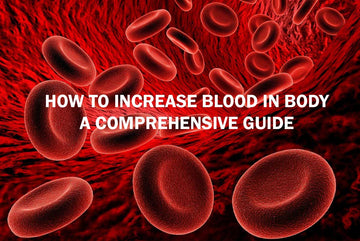
In the quest for better health and overall well-being, understanding how to increase blood in the body is of paramount importance. An adequate blood supply is not only vital for carrying oxygen and nutrients to various organs but also plays a pivotal role in maintaining optimal bodily functions. In this comprehensive guide, we delve into the intricacies of boosting blood production and circulation to help you achieve a healthier and more energetic life.
The Significance of Healthy Blood | how to improve blood
Before we embark on the journey of enhancing blood in the body, let's first grasp the significance of healthy blood. Blood serves as the lifeline of our bodies, performing several crucial functions:
1. Oxygen Transport
Hemoglobin, a protein present in red blood cells, binds with oxygen, allowing blood to transport this vital gas from the lungs to every cell in the body. Oxygen is the fuel that keeps our cells functioning optimally.
2. Nutrient Delivery
Blood is responsible for transporting essential nutrients, such as glucose, vitamins, and minerals, to various organs and tissues. These nutrients are essential for cellular growth, repair, and overall vitality.
3. Waste Removal
Blood carries away metabolic waste products, including carbon dioxide and urea, to be eliminated from the body through the lungs and kidneys. Efficient waste removal is critical for preventing the buildup of toxins.
4. Immune System Support
White blood cells are the foot soldiers of our immune system. They circulate in the blood, defending the body against infections and diseases.
Boosting Blood Production
Now that we understand the importance of healthy blood, let's explore how to increase blood in the body effectively.
1. Nutrient-Rich Diet
A balanced diet is the foundation of good health. To promote blood production, incorporate iron-rich foods like spinach, lean meats, and beans into your meals. Vitamin C-rich foods like citrus fruits enhance iron absorption.
2. Stay Hydrated
Adequate hydration is key to maintaining blood volume. Ensure you drink enough water daily to prevent dehydration, which can lead to decreased blood circulation.
3. Folic Acid and Vitamin B12
Folic acid and vitamin B12 are essential for red blood cell production. Foods like leafy greens, eggs, and fortified cereals are excellent sources of these nutrients.
4. Exercise Regularly
Physical activity stimulates the production of red blood cells. Incorporate both aerobic exercises like jogging and strength training into your routine to boost blood circulation.
Improving Blood Circulation
Enhancing blood production is only part of the equation. Improving blood circulation is equally crucial for overall health.
1. Cardiovascular Exercise
Engage in activities like swimming, cycling, or brisk walking to get your heart pumping. These exercises improve blood flow and strengthen your heart.
2. Massage Therapy
Regular massages help relax muscles and promote blood circulation. Pay special attention to areas prone to tension, such as the neck and shoulders.
3. Avoid Prolonged Sitting
Sitting for extended periods can impede blood circulation. Take breaks, stretch, and walk around to keep your blood flowing effectively.
4. Compression Garments
Compression socks or stockings can assist in blood flow, especially if you're prone to swelling or have circulation issues.
Herbal Remedies and Supplements
In addition to dietary and lifestyle changes, certain herbs and supplements can aid in increasing blood production and circulation:
1. Ginseng
Ginseng has been used for centuries to improve blood circulation and boost energy levels. It's available in various forms, including supplements and tea.
2. Ginkgo Biloba
Ginkgo biloba enhances blood flow to the brain and extremities, potentially improving cognitive function and circulation.
3. Iron Supplements
If you have an iron deficiency, consult with a healthcare professional about iron supplements to support red blood cell production.
How to Increase Hemoglobin Levels Quickly: Tips for Better Blood Health
Maintaining optimal hemoglobin levels is crucial for overall health and vitality. Hemoglobin is a protein found in red blood cells that carries oxygen throughout the body. If your hemoglobin levels are low, you may experience fatigue, weakness, and other health issues. Fortunately, there are several strategies you can implement to increase hemoglobin levels quickly and efficiently.
1. Iron-Rich Diet
Incorporate iron-rich foods like lean red meat, poultry, fish, leafy greens, beans, lentils, nuts, and seeds into your meals.
2. Vitamin C Enhancement
Pair iron-rich foods with vitamin C-rich options like citrus fruits, strawberries, and bell peppers to enhance iron absorption.
3. Pomegranate Power
Include pomegranate in your diet, as it not only boosts hemoglobin levels but also improves blood circulation.
4. Avoid Iron Blockers
Limit or avoid substances that inhibit iron absorption, such as calcium, tea, coffee, and antacids.
5. Cook in Iron Pots
Cook certain foods in iron pots and pans, particularly acidic dishes, to increase your iron intake.
6. Consider Supplements
Consult your healthcare provider before taking iron supplements to ensure they're necessary and safe for you.
7. Stay Hydrated
Proper hydration supports efficient oxygen transport in the blood.
8. Get Active
Engage in regular exercise, including both cardiovascular workouts and strength training, to stimulate red blood cell production.
Conclusion
In conclusion, understanding how to increase blood in the body is essential for maintaining optimal health and vitality. By following a nutrient-rich diet, staying hydrated, engaging in regular exercise, and considering herbal remedies and supplements, you can take proactive steps to boost blood production and circulation.
Remember, a healthy blood supply is the foundation of overall well-being. By implementing these strategies, you can take charge of your health and enjoy a more energized and vibrant life.
- Blood health,
- Boost hemoglobin,
- Exercise,
- Exercise benefits,
- Health And Wellness,
- Health Benefits,
- Hemoglobin,
- Hemoglobin boost,
- Hemoglobin levels,
- Hemoglobin-boosting foods,
- Hydration,
- Hydration Tips,
- Iron blockers,
- Iron supplements,
- Iron-rich diet,
- Nutrient-rich diet,
- Pomegranate,
- regular exercise,
- Vitamin C



